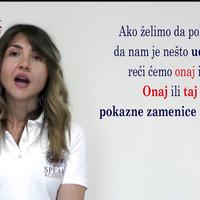Lesson 9.4 Part II Serbian Language - Questionable forms of reflex verbs (futur)
|||||doubtful|||reflexive||
||||||||||futuro
Lektion 9.4 Teil II Serbische Sprache – Fragwürdige Formen von Reflexverben (Zukunft)
Lesson 9.4 Part II Serbian Language - Questionable forms of reflex verbs (future)
Lección 9.4 Parte II Lengua serbia - Formas cuestionables de verbos reflejos (futuro)
Leçon 9.4 Partie II Langue serbe - Formes discutables des verbes réflexes (futur)
Lezione 9.4 Parte II Lingua serba - Forme discutibili dei verbi riflessi (futuro)
Les 9.4 Deel II Servische taal - Twijfelachtige vormen van reflexwerkwoorden (toekomst)
Урок 9.4 Часть II Сербский язык - Вопросительные формы возвратных глаголов (будущее)
Lektion 9.4 Del II Serbiskt språk - Tveksamma former av reflexverb (framtid)
Ders 9.4 Kısım II Sırp Dili - Refleks fiillerin şüpheli biçimleri (gelecek)
课 9.4 第二部分 塞尔维亚语 - 反身动词的可疑形式(将来时)
Buduće vreme - upitni oblici II
||interrogative||future tense
Future tense - interrogative forms II
Upitni oblici refleksivnih glagola grade se na sledeći način:
DA LI, zatim kraći oblik glagola hteti, zatim SE, + imenica ili zamenica i infinitiv
||then|||||||||||
Odnosno, drugi način, ako ne koristimo konstrukciju DA LI:
||||||construction||
glagol hteti + LI + rečca SE, + imenica/zamenica + infinitiv
Na primeru glagola sresti se to izgleda ovako:
|||to meet||||
DA li ćemo se Marina i ja sresni na Egzitu?
||||Marina|||meet||the Exit
|||||||||Exit Festival
Will Marina and I meet at Exit?
Hoćemo li se Marina i ja sresti na Egzitu?
Will|||Marina|||meet||Exit
Will Marina and I meet at the Exit?
Da li će se ova deca posvažati?
|||||children|get into a fight
Will these kids argue?
Hoće li se ova deca posvažati
|||||get into a fight
Will these kids argue?
Ukoliko žrlimo da damo do znanja da nam je neki pojam blizu, koristićemo pokaznu zamenicu ovaj
If|we want||we want to||knowledge|||||concept||we will use|demonstrative|pronoun this|
If we want to indicate that a certain concept is close to us, we will use the demonstrative pronoun 'this'
Ovaj je zamenica za blizinu. Nešto vam je blizu
||||proximity||||
'This' is a pronoun for closeness. Something is close to you
Ovaj sat je skup
|watch||expensive
This watch is expensive
Ovaj znači sat koji je kod mene, blizu mene, ispred mene
||||||with me|||in front of|
This means the watch that is with me, near me, in front of me
Ovaj sat je skup
This watch is expensive
Ako želimo da pokažemo da nam je nešto udaljeno, reći čemo onaj ili taj.
|||we show|||||distant||we will|||
If we want to show that something is distant, we will say that one or that.
Ovaj ili taj su pokazne imenice za daljinu
||||demonstrative|||distance
This or that are demonstrative pronouns for distance
Taj čovek preko puta ulice čini mi se poznat
||||||||familiar
|||de enfrente|||||
That man across the street seems familiar to me
Za blizinu ovaj ili taj
For closeness this or that
Izmenjamo sada glagole šetati i šetati se u potvrdnom, odričnom i upitnom obliku futura
we change|||to walk||||||negative||interrogative||
We will now change the verbs 'to walk' and 'to take a walk' in the affirmative, negative, and interrogative forms of the future tense
Pokušajte sami
|yourself
Try it yourself
Šetati se
To take a walk
Kao što smo i ranije napomenuli u svakodnevnom govoru, buduće vreme iskazuje se prezentom
|||||mentioned||||||is expressed||present tense
|||||||cotidiano||||||
As we mentioned earlier in everyday speech, the future tense is expressed in the present.
Na primer
For example
Ići ću u bioskop
I will go to the cinema
Sutra idem u bioskop

